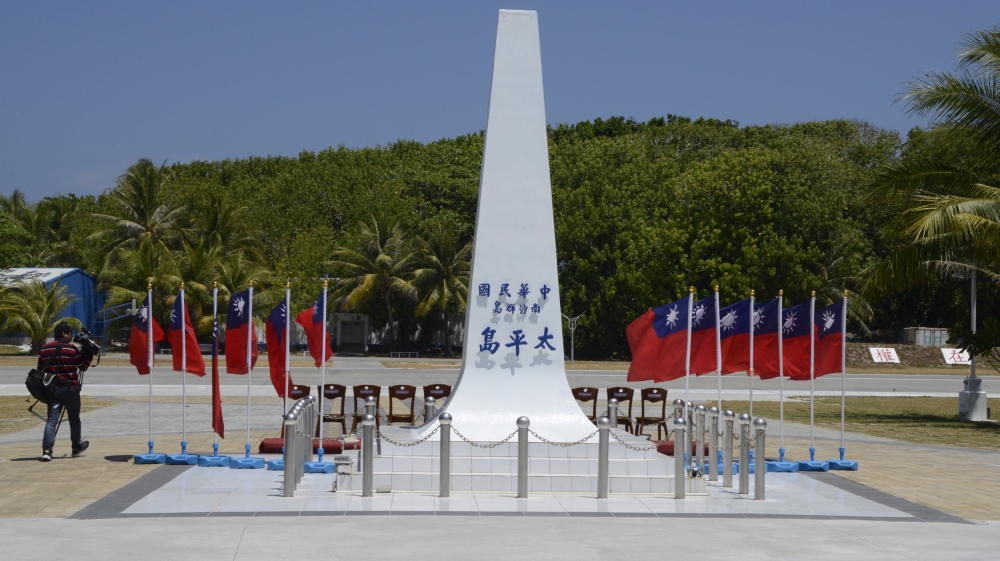Taiwan ministry issues statement in simplified Chinese, to the chagrin of mainlanders

The traditional, unsimplified Chinese script, for many in Taiwan, forms a basis for national identity. However, the Ministry of Foreign Affairs in Taiwan recently made the decision — an intentional and pointed one, observers say — to issue a statement in simplified Chinese, in response to a remark by Beijing.
The remark in question was made on June 28 by Senior Colonel Wu Qian 吴谦, spokesperson of China’s Ministry of National Defense, at a press conference. “The idea [of leasing the Taiping Island 太平岛 to the U.S.] is very dangerous,” he said, emphasizing that the People’s Liberation Army would defend “integrity of [China’s] sovereignty.”
The only problem is that Taiwan has never officially said it intended to lease Taiping Island — also known as Itu Aba, the largest of the Spratly Islands in the South China Sea, off the west coast of the Philippines, administered by the Republic of China — to the U.S. or any other country.
The confusion was likely due to a report by the Institute for National Defense and Security Research — a think tank established by the Taiwanese government in May — which suggested that Taipei should lease Taiping Island to the U.S. military for humanitarian purposes.
While the Taiwanese Ministry of Foreign Affairs clarified on June 10 that it did not intend to implement such a plan, it felt the need to make a second denial following Wu Qian’s June 28 comments.
It wrote in a statement on June 29: “In response to the false claim made by Chinese PLA spokesperson Wu Qian regarding our government leasing Taiping Island to the U.S. military, the Taiwanese Ministry of Foreign Affairs would like to reaffirm our [denial] made on June 10.”
But here’s where it gets interesting: the statement was issued in both traditional Chinese and simplified Chinese, which is used in mainland China.
“If you have trouble reading traditional Chinese characters, please reference the simplified version below,” Taiwan’s Ministry of Foreign Affairs wrote.*
This was the first official statement from the Taiwanese Ministry of Foreign Affairs written in simplified Chinese, said the ministry’s spokesperson, Andrew H. C. Lee.
The use of simplified Chinese is widely believed to be a sign of gamesmanship from the Taiwanese government — a jab of sorts at Beijing, as if to say, “Let me say this slowly for you so that you understand…”
Unsurprisingly, this has rankled some mainland Chinese observers. “Even among the young generation in mainland China, while most use simplified characters, they are also able to read traditional script,” wrote Hu Zonghao 胡宗浩, a mainland Chinese doctorate student at Taiwan’s Fu Jen Catholic University 輔仁大學 in an article published on Guancha.cn, a Shanghai-based commentary website that publishes many nationalistic opinions.
As a retort, many Chinese commentators — including Hu — poked fun at Taiwan’s incorrect use of certain characters in the statement. For instance, the statement converted the word for “plan” — 計畫 (jìhuà) — directly from traditional to simplified form, 计画. While the pronunciations are the same, the correct form of the word in the simplified script should be 计划.
President Tsai Ing-wen 蔡英文 has previously tweeted in simplified characters in February, when she expressed her condolences to mainland Chinese victims of the Hualien earthquake. “There is no distance between two sides of the Taiwan Strait when it comes to humanitarian relief,” Tsai wrote on Twitter in simplified Chinese. “We will try our best. Both sides of the strait will send prayers to them.”
在这次花莲地震中,有几位来自中国大陆的旅客不幸遭难,我们向罹难者的家属致上最诚挚的慰问。
尚未寻获的五位中国大陆旅客,我们不会放弃任何希望。在人道救援上,两岸没有距离。我们会尽最大的努力。两岸一起为他们祈福。
— 蔡英文 Tsai Ing-wen (@iingwen) February 9, 2018
The context for the use of simplified characters this time, of course, was very different.
* The statement:
- The Taiwanese Government has never planned to lease Taiping Island to foreign nations. Other countries, including the U.S., have never made such a request, either. False allegations from home and abroad are apparently intended to create regional instability or cross-strait dispute. The Ministry of Foreign Affairs hereby clarifies and demands a stop to the rumors about the Taiwanese government and the attacks against us.
- The Republic of China is a responsible member of the international community. Our government has always followed the “Four Principles,” “Five Practices,” and other policy instructions on the issue of the South China Sea as directed by President Tsai Ing-wen on July 19, 2016.
- The Republic of China government once again urges that issues concerning the South China Sea be settled through peaceful consultation in accordance with the United Nations Convention on the Law of the Sea. The countries concerned should collaboratively protect the freedom of navigation and airspace of the South China Sea, stop militarization or any measures that may increase regional tensions, and jointly safeguard peace and stability in the South China Sea region.





